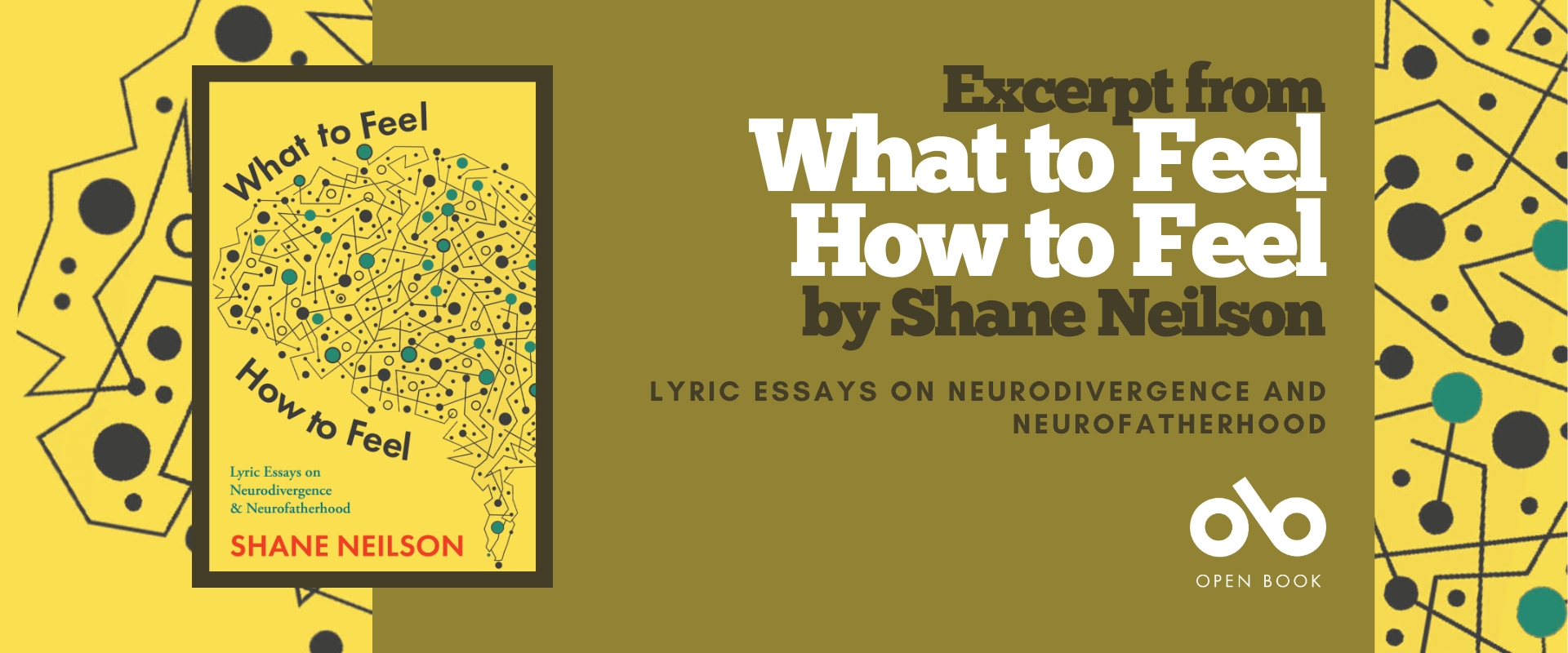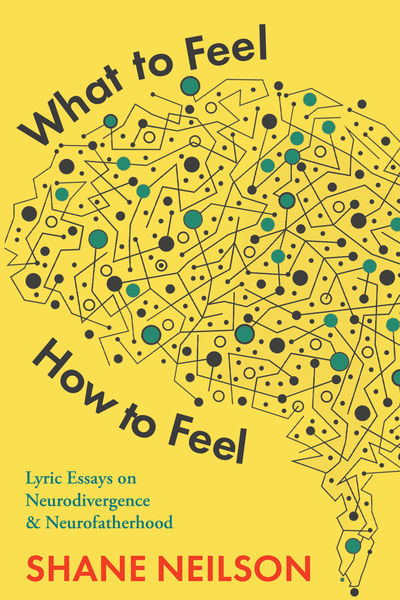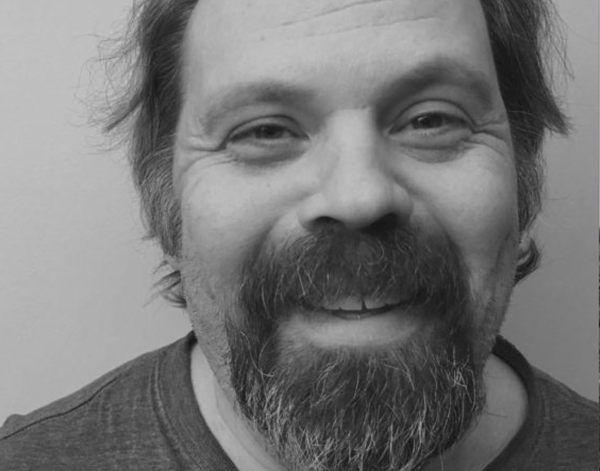Read an Excerpt From Shane Neilson's Moving Collection of Essays, What to Feel, How to Feel
Today we're featuring a fascinating collection of lyric essays from poet and physician Shane Neilson, a neurodivergent artist and academic whose unique work has been published widely, and to great acclaim.
In What to feel, How to feel (Gordon Hill Press/Palimpsest Press), Neilson uses this form to focus on non-neurotypicality, and to investigate his supposed difference of self. He also takes a hard look at the way that society treats folks who are neurodivergent throughout the course of their lives, and how they are often misunderstood and discriminated against even in scientific and medical fields. Empathy and heart bring all of these essays to life on the page, with the author tying in his own experiences from childhood to fatherhood.
We're delighted to share an excerpt from this groundbreaking and original collection of essays today on Open Book, and to give our readers a glimpse into a title that covers subjects that are yet to be aptly explored in Canadian Literature.
Check it our below!
An Excerpt From What to Feel, How to Feel, by Shane Neilson
DIFFERENTIAL
Maybe someone like me comes along, and you feel it before you see it, or you see it and then suddenly feel it; you see it and feel, Hey, he’s different. Like obscenity, you know when difference is in your presence. You said retard, you said quad, you said weirdo, you said it again and again and again.
I’ll come wearing loose-fitting clothes somehow ill-suited to my body, my face on one of two settings (blankness or anger), and my voice will, despite a formal articulateness, seem livid. I’ll speak at length, endlessly riffing on the variations of an idea and its effects. I’ll wear you out. I’ll wear you down. I’m not able to tell. You’ll leave or object; then I will feel the usual shame, the familiar chronic misunderstanding. Why couldn’t things be different?
The sadness is—they cannot be. The world is not that way.
The sadness is—I am different.
Your CanLit News
Subscribe to Open Book’s newsletter to get local book events, literary content, writing tips, and more in your inbox
The world is at a variance to me, but I see it, I feel it. Therein is the difficulty, an aspirational one. If I can see and sense the world, then why can it not welcome me?12
The strangest quality about being different—a difference signalled early on by others but only tragically understood later—is unfoldingness, constant becoming and unbecoming. Only by ignoring what I call the “differential constant,” meaning how I affect others and how others affect me, could mutually constructed difference become simple. Stigma makes things easy for you. Stigma means I am bad and you are good.
Difference is the condition I’ve known my entire life. Once upon a time, I was on a panel struck by the Physician’s Health Program of Ontario. Each of the gathered physician panellists retailed their personal histories as if they were a testimonial to the merits of overcoming struggle, their episodic challenges mere way stations to a better life, detours that somehow invested the future with greater brightness. Their accounts proceeded like this:
At some point in my medical training, I got sick due to either mental illness or addiction.
I couldn’t work.
It was very bad.
I felt very bad.
But I enrolled in the Physician’s Health Program, and got better.
Now I can work!
And the work I do is informed by the struggle I went through.
I am a better physician for the experience!
After hearing this repetitive misvoicing of disability, a telling of disability warped through the medical model, I said: “Rather than give a history in which I entered medical training, got ill, then got better again so that I could return to successful practise, I’ve been living out as a weirdo for years!” And the truth is, I’ve always been strange. To honour all the neurodivergent people out there—here’s to the four points, the corners we’ve stood in, our innings in not-normal—let me tell this story instead:
I’ve always been what you’d call unwell or different.
My experience has never been one of normality.
I’m the son of a mentally ill alcoholic.
I’ve experienced illness periodically my entire life.
I took pleasure in confessing to biomedicine’s clerics that I was non-normative long before entering medical school, that I was unwell in medical school itself, and during my residency, quite ill. Though I too enrolled in the Physician’s Health Program eventually, and returned to practice like my other panellists, I did so without eradicating the substance of my disability, its character or mark.
I’ve always been unwell to a biomedical way of thinking, and that’s why, in this book, I’m going to speak about ableism, the stultifying force that polices my difference. Though it takes many forms, and can be well-intentioned, it is the reason that freedom, the quality I’ve sought all my life, is impossible. The world normalizes, we normalize, we prefer the things that are like. We prefer what we like, versions of us, reflections staring back. Reciprocity. Predictability. When we say we all share the fact of humanity, we say, as individuals: I love myself and I want to be happy with all the other mes, let there be a cavalcade of mes, all of us rightly desperate to be with me.
Jerome Mazzaro points out that the title of Robert Lowell’s Land of Unlikeness, his first book from 1944, is ripped from a quotation of Saint Bernard; he further explains that the quote pertains to the “human’s soul’s unlikeness to God and unlikeness to its past self.”
The human soul, often exclusionary and mean, finds distraction in baubles and screens. We all seek the same thing—beauty. The clouds move by my window hour after hour, each one made of the same material, and yet unlike the last. I have never seen a human soul, but I have detected the darkness in bodies. Perhaps seeing a soul, seeing the “human,” is a condition of normativity?
Difference is more than wistfulness. Difference is never accepting the abuse that comes while being powerless to stop it. No one can right the misalignment in the universe because the misalignment is actually a correction. Call us anomalies, disruptions, glitches—we’re the dark matter you need to make your universe make sense. We’re paradisical rupture. We who cannot speak like you, to you, are perceived as constituted of lack. But you lack comprehension, for difference is not lack. You need us to be perfect? First of all, you are not perfect. Second: your brand of perfection is an oppressive prison, and you need us to inform you of your lack of freedom. You need us to free you though we can never be free from you.
God, I often hate all the likes, all the little likes running around liking their preferred likes, their stock of likes, operating within a stockade excluding the unlikes.
In “Not in Kansas” by The National, a female chorus sings:
Time has come now to stop being human
Time to find a new creature to be
Be a fish or a weed or a sparrow
For the earth has grown tired and all of your time has expired
We’re not exactly new. But being more like us could be a new experience for you.
In the fall of 2019, I’ve been—finally, after avoiding the prospect for decades—diagnosed as being on the autism spectrum. Though the diagnosis makes much-consolidating sense of my life—the “key” metaphor is accurate—it also means I must manage the confused feelings brought about by being, to a particular manner of thinking, precisely what the stigmatizing figures I’ve encountered in my life said I was.
Stupid.
Retard.
Moron.
Idiot.
Rain Man.
_____________________________________________
Shane Neilson is a mad and autistic poet-physician who practices in Guelph, Ontario and who teaches health humanities at the Waterloo Regional Campus of McMaster University. His prose has appeared in the Walrus, Maisonneuve, Image, the Globe and Mail, and many other places.







